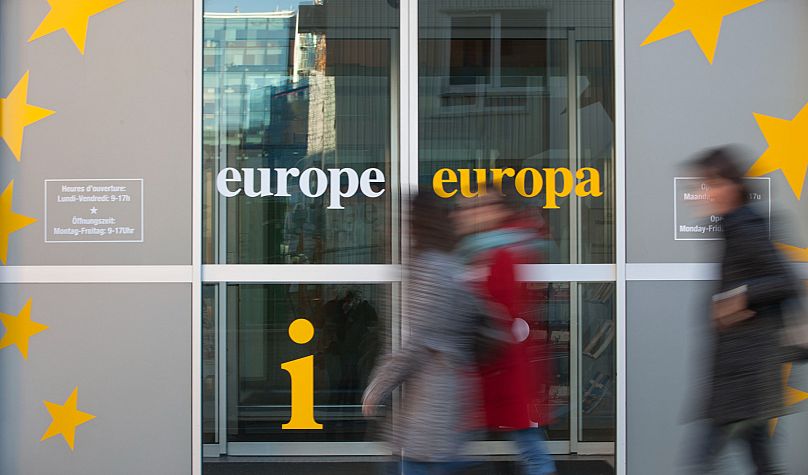Auto-enrolment: The quiet pension reform that could transform Europe’s economy

Europe is sitting on a paradox. On the one hand, the continent faces enormous investment needs—from financing the green transition and upgrading infrastructure to supporting innovation and competitiveness against global rivals.
On the other hand, European households hold trillions of euros in savings, much of it sitting passively in bank deposits that yield little and do very little to power growth.
A new Bruegel working paper, Plugging Europe’s Investment Gap: Understanding the Potential of Leveraging Institutional Investors, examines this mismatch through the lens of Europe’s institutional investors, namely insurance companies and pension funds, also known as ICPFs.
These institutions sit at the heart of the problem and, potentially, offer one of the solutions.
Where are Europeans holding their money?
Europeans are generally conservative investors, with most people keeping their savings in banks where they accrue little-to-no value over the years.
An institutional investor is a big organisation that invests money on behalf of people or households. Unlike an individual, who might buy a few shares or open a savings account, these institutions manage huge pools of money and invest it in different financial markets.
The most common types of institutional investors are pension funds, who manage the retirement savings for workers, and insurance companies, who invest the premiums or subscriptions people pay to cover future insurance claims.
Funded vs regular state pensions
The report frames pensions and investment as two sides of the same coin.
Europe’s ageing population puts pressure on pay-as-you-go pension systems, while at the same time the continent faces huge financing needs.
According to the pay-as-you-go system, the money that today's non-retired workforce puts into the pension fund is immediately taken out and given to today's retirees. In the future, when today's workers retire, future workers will pay for their pensions.
Except, if you have an ageing population, then the group of retirees will be much larger than the group of future workers who will cover for them.
A funded pension scheme is a retirement plan where some of the money you and your employer pay in is actually saved and invested, rather than spent right away. Over time, those investments in things like stocks or bonds grow, so you build up a pot of money for when you retire.
Funded pension schemes, if expanded, can help address both problems at once. By securing more retirement savings for households and channelling that money into long-term projects, they become a bridge between private wealth and collective investment needs.
Europe vs the United States
The debate often centres on whether Europe is “losing” capital to the United States. Indeed, European pensions and insurers do hold US assets, particularly equities.
Between 2013 and 2023, the share of US equities in European ICPF portfolios rose from 23% to 39%. Over the same period, US debt holdings rose more modestly, from 6% to 11%.
But relative to the sheer size of US capital markets, this is not as large as it might seem.
“So while it’s true that a lot of savings in pension funds and insurance companies go to the US, it’s also true that relative to the sheer size of the US market, it’s actually not that much. This basically shows that, and our results show, there is actually an underinvestment in the US from the whole EU," Marie-Sophie Lappe, one of the authors of the report, told Euronews.
In other words, Europe’s institutional investors are still home-biased. They overwhelmingly prefer to keep money inside Europe, particularly in government and corporate bonds. This stands in sharp contrast to US pension funds, which allocate much more heavily to equities and alternative investments, including venture capital.
Why this difference? Familiarity, currency and caution all play a role.
“Possible explanations are, for example, that people are more familiar with their home market and their home politics. The Belgian pension fund is more likely to be an expert on the Belgian economy than any other.
"Language is another driver. Currency risks play a role too, especially when pension funds and insurance companies are obligated to pay out their clients in euros," Lappe continued.
Pension design remains firmly in the hands of national governments, but the EU can still play a supporting role.
The Bruegel paper argues that Brussels should focus on applying best practices such as auto-enrolment, while also working to make Europe’s capital markets more integrated and efficient. If institutional investors are able to invest more smoothly across borders, they can scale up and diversify their portfolios.
But any reform, the authors stress, must keep the saver at its centre—pensions are first and foremost about retirement security, not just a tool to plug Europe’s financing gap.
Households: Too much money in bank accounts
The bigger problem may not be where ICPFs invest, but how little money actually flows into them in the first place.
Today, approximately 27% of household savings in the EU are invested in insurance and pensions, nearly equal to the share allocated to currency and deposits. In other words, Europeans are still keeping vast sums in low-yield bank accounts, missing out on the potential returns of capital markets.
“We argue that the outflow of investments to the US is not necessarily a concern for EU markets if we just get to scale up the sector by funnelling savings that are currently stuck in currency and deposits. In the EU, a lot of households keep their savings in a bank account, which is very low yield. It doesn't generate many returns for the future,” Lappe explains.
Shifting even a small portion of this money would unlock huge capital for investment.
"We did this back-of-the-envelope calculation, if for every 100 euros in an EU bank account, you would shift 10 euros into the ICPF sector, you would mobilise just above 400 billion euros that go into debt securities and listed shares," she continued.
Auto-enrolment: A small reform, big impacts
How could that shift be made? One answer is auto-enrolment into funded pensions.
Auto-enrolment works by making investment the default. Workers are automatically signed up to a funded pension scheme—which then channels their savings into capital markets—with the option to opt out. Experience in countries like the UK shows participation rates skyrocket under this system, because inertia keeps most people enrolled.
“If you only relied on people to invest themselves, you would need to spend a lot of time in financial literacy, which has been tried over the years, but largely hasn’t been very successful. So to really mobilise savings across the board, this would be a very helpful policy," Lappe explained.
In other words, financial literacy campaigns help, but they are not enough. Default mechanisms like auto-enrolment are far more efficient.
Savers must be the priority
The Bruegel paper’s conclusion is important: Europe does not actually need to worry too much about capital “leaking” to the US. Instead, the real issue is the untapped potential sitting idle in household savings accounts. And in times of uncertainty, the instinct to sit tight only grows stronger.
Redirecting even a small fraction of that money into funded pensions and insurers could not only strengthen retirement security but also fuel Europe’s investment needs: greening the economy, financing innovation and making capital markets more robust.
Auto-enrolment is not flashy. It will not grab headlines like a trillion-euro stimulus plan. But as the paper argues, it may be the quiet reform with transformative potential.
The authors warn, however, against using pensions as a piggy bank for political or economic projects. The first duty of insurers and pension funds is to protect and grow people’s savings, and any boost to Europe’s investment gap should be treated as a welcome side effect, not the main goal.
If governments push funds to favour certain regions or industries at the expense of careful investing, it could end up harming the very savers these reforms are meant to benefit.
Yesterday


